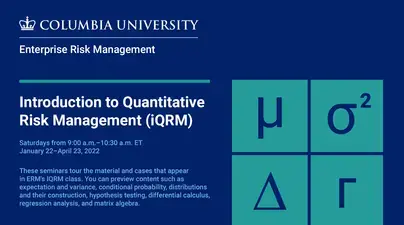Introduction to Quantitative Risk Management (iQRM) Seminars, presented by the ERM Program

The Introduction to Quantitative Risk Management (iQRM) seminars tours the material and cases that appear in our iQRM class. This allows beginners to get a preview of the class content and advanced quantitative students can see the applications of the tools presented and prepare to test out of the iQRM class by taking the iQRM waiver exam. Enrolled students are also welcome to attend to get a refresher.
How To Join a Session
Click on the Join a Session button at 9:00 am ET on the day of your desired workshop. Each workshop ends at 10:30 am ET.
Workshop info:
Jan 22 | 9:00 am to 10:30 am ET
Excel
In our first iQRM seminar we cover Excel. Excel is an amazing tool widely used for analytics, modeling, trading, and communication. This seminar starts with the basics and quickly moves on to more complicated Excel functions.
Jan 29 | 9:00 am to 10:30 am ET
Financial Math 1
Time value of money calculations are everywhere… Our personal plans and professional projects both span time. You must understand basic financial math to understand risk and value over time.
Feb 5 | 9:00 am to 10:30 am ET
Financial Math 2
We continue building a foundation with concepts such as normal distributions for stock returns and lognormal distributions for stock levels; continuous compounding, expected returns and the variance of returns.
Feb 12 | 9:00 am to 10:30 am ET
Probability 1
To manage risk, we must measure it. In this session we take our first steps in the mathematics of chance. We explore expected value, variance, and the variance of averages.
Feb 19 | 9:00 am to 10:30 am ET
Probability 2
In this session we continue building our foundation in probability by exploring the impact of correlation on the estimation of variance.
Feb 26 | 9:00 am to 10:30 am ET
Statistics 1
Statistics is the application of probability theory to data. Using statistical descriptions of data, you can determine the probability of events. We can also use the distributions that we understand to decide whether to reject hypotheses.
Mar 5 | 9:00 am to 10:30 am ET
Statistics 2
In this session, to solidify our understanding of hypothesis testing distributions, we construct those distributions and see how they are derive from the normal distribution.
Mar 12 | 9:00 am to 10:30 am ET
Simulation
Simulation is a tool in risk management where we synthesize data we can’t get in order to make inferences about the variability of that data. Simulating data can also help us better understand the data we do have.
Mar 26 | 9:00 am to 10:30 am ET
Differential Calc
In mathematics, a derivative is a calculation of how much one variable changes when other variables change. In Risk Management, this is a concern that arises all the time… How much will a bond change in value if interest rates change? How much will a stock price change if a major stock index changes? How much will a company's probability of default change if sales change?
Apr 2 | 9:00 am to 10:30 am ET
Regression
Regression Analysis is a fundamental tool in science and risk management. In this session we explore the assumptions and mathematics necessary to use this tool.
Apr 9 | 9:00 am to 10:30 am ET
Matrix Algebra
Risk and life comes in systems. What is the variance of multiple risks? What is the variance of a portfolio? Matrix Algebra is the mathematics of systems. In this system we explore the basics of matrix algebra as applied to portfolio risk.
Apr 16 | 9:00 am to 10:30 am ET
Parameter & Process Risk
The terms Parameter risk and Process risk refer to the variability in forecasts that comes from the model itself versus the variability that comes from the process we are modeling. We show how bootstrapping and refitting are used to measure the variability of any model.
Apr 23 | 9:00 am to 10:30 am ET
Review
We review major threads that run through the material such as the construction of distributions and their use in hypothesis testing, differential calculus and the construction of linear and logistic regression, matrix algebra and the modeling of systems.
Apply
We encourage you to apply as soon as possible.
Request Information
Stay in the know with updates sent straight to your inbox.